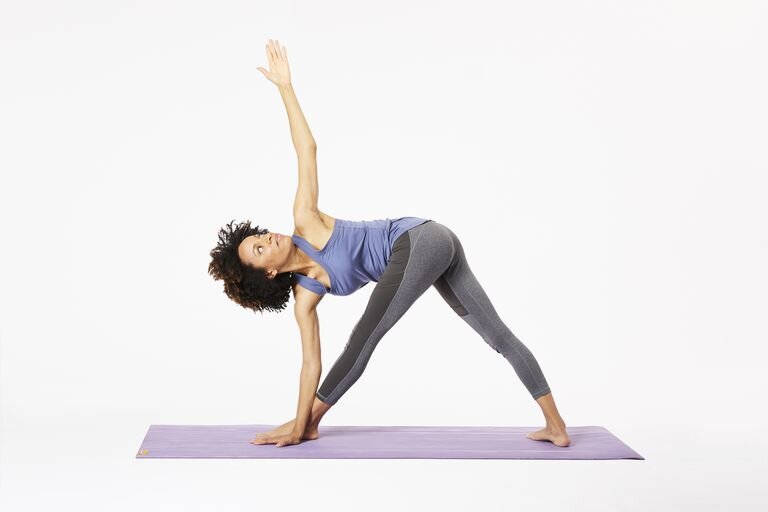You Hip Abs - Keep your back and knees in check
When the outer hip muscles, aka the hip abductors, get tight or weak, they can pull out our pelvis and lead to hip and lower back and knee pain.
What are the hip abductors?
These are the muscles at the side of the hip which serve to pull your leg out to the side (hip abduction). They include the:
Photo by ChrisChrisW/iStock / Getty Images
What do the hip abductors do?
While you might ask, how often do I lift my leg out to the side? I’m not a dog marking its territory?! But we actually use this movement everyday. We use it when
We get out of bed,
We get out of the car, and
When we step to the side.[iii]
Photo by IPGGutenbergUKLtd/iStock / Getty Images
It also keeps our hips level whenever we put our weight on one foot such as when we,
Walk,
Run,
Stand while leaning on one leg.[iv]
What causes tight or weak hip abductors?
There are several reason in our everyday lives that can cause weak or tight hip abductors. These include:
Standing with our weight on one leg,
Sleeping on our sides with the top leg crossed over our bottom one, and
Sitting cross legged for long periods of time.[vii]
How do I know if I have tight hip abductors?
Here at Design Your Life, we seek to use science to give you new perspectives and information to help you design the life you want, today. However, we would always recommend that you seek professional medical and fitness advice for your own individual body.
The best way is to do a functional screening and muscle length test with a physiotherapist or personal trainer who is trained to undertake such as assessment.
However, you can do this test at home to get a good indication.
One indication is hip tiling whilst walking.
If this is the case, you can try a modified Thomas test.
Essentially, you lie on a flat surface (a massage table works well) with one leg toward your chest and the other with the but on the edge and the leg hanging over the edge.
Have a look and see if your knee is directly inline with your hip or if it is pointing outward. If it is pointing outward, it is a good indication that your hip abductors are tight (in B below).
So I have tight or weak hip abductors, what can I do?
Mobility
Side Plank with Clam Shell
1. Lie on your side with your elbow under your shoulder.
2. Leaving your bottom knee on the ground push up into a modified side plank with both legs bent.
3. Rotate the top knee out and in (up and down) like a clam shell opening and closing (hence the name).
4. Do this about 12-15 times.
If you want something more challenging, you can use a resistance band around your calves or thighs.
Side Balance Leg Circles
On your side, place your hand under your shoulder and your knee under your hip.
Lift the top leg off the ground so that it is the same height as your hip.
Create 10 circles with the top leg on in direction then reverse directions.
Repeat on the other leg.
Lateral Leg Swings
Stand on one leg. (feel free to hold on to something for balance if you need)
Swing your leg out to the side.
Swing it back through centre.
Ensure the movement is controlled.
Self-Myofascial Release / Self-Massage
TFL Roll
Place your across your mat
On your front with your right leg straight and your left leg bent.
Lower your right TFL onto the roller
Gently roll backward and forward
You can replace the roller with a massage ball if you want to get a bit deeper.
Repeat on the other side
Yoga
Legs Crossed Forward Fold
From a standing position cross your left foot over your right foot.
Reach yours arms overhead and then reach your arms and head down toward the inside of your right (rear) foot. You should feel a stretch along the outside of your right leg. (ensure your knees have a soft bend in them)
Repeat on the other side.
https://redefiningstrength.com/dont-ignore-this-nasty-little-sucker-the-tfl-or-tensor-fasciae-latae/
Twisted Triangle
Stand at the front of your mat with your feet about hip width part.
Step your right leg back and point your right toes to about the 1-2 O’clock position (diagonally forward and to the right).
Choose a stance that allows you to keep your hips facing the front of the mat (widen or shorten your stance if need be).
You can place a block to the outside of your left foot in need be.
Reach your right hand to the outside of the left foot (or block if you are using one).
If you feel comfortable to, reach your left hand up toward the sky.
Repeat on the other side
Pigeon Pose
Start in downward facing dog.
Move one knee forward to the same wrist.
Slide the rear leg backward and untuck the toes.
Place a blanket or block if your hips are elevated.
Lower to elbows if comfortable.
Conclusion
The hip abductors get tight when we sit crossed legged and stand with our leg on one weight. When they are tight or weak it can hinder everyday movements and lead to lower-back and knee pain. Here are some exercises that may help.
You can also get your FREE 2 week Recharge trial and we’ll go through these techniques with you.
The EVERYDAY can lead tight or weak hip abductors.
Come to Recharge and Move BEYOND the EVERYDAY.
[i] https://www.healthline.com/health/fitness-exercise/hip-abduction
[ii] https://www.verywellhealth.com/back-pain-relief-through-outer-hip-muscle-stretching-297195
[iii] https://www.healthline.com/health/fitness-exercise/hip-abduction
[iv] https://www.healthline.com/health/fitness-exercise/hip-abduction
[v] https://www.precisionmovement.coach/hip-abductor-stretches/
[vi] https://activehlth.com/hip-abductor-weakness/
[vii] https://www.physio-pedia.com/Gluteus_Medius









